Deputy Chairman of the Committee for Science, Technology and Environment Nguyen Phuong Tuan chaired the workshop. Attending the workshop were Deputy Minister of Science and Technology ; representatives of the Ministries of Public Security, Finance, Justice, Education and Training; enterprises in the field of digital technology industry, experts and scientists.
The Draft Law on Digital Technology Industry consists of 7 chapters and 57 articles. The Draft Law is built on the basis of selectively inheriting relevant provisions of the Law on Information Technology and documents guiding the implementation of the information technology industry; consistent with the current legal system on investment, finance, science and technology and synchronized with related Law projects to ensure unity and synchronization in the legal system, facilitating implementation and application.
The draft Law on Digital Technology Industry is built closely following the policy groups that have been unanimously approved by the Government: Digital technology industry activities, digital technology products and services; Ensuring the development of digital technology industry. The draft Law shows new and more drastic perspectives in the approach to developing the Digital Technology Industry in Vietnam, especially with superior preferential policies for foreign investors, as well as policies for domestic enterprises to participate in this field with many opportunities. With important amendments, many experts, representatives of associations and enterprises expect that Vietnam can become the leading destination in Southeast Asia for digital technology investors. To turn this expectation into reality, Vietnam must strengthen and create conditions to attract investment in developing the digital technology industry.
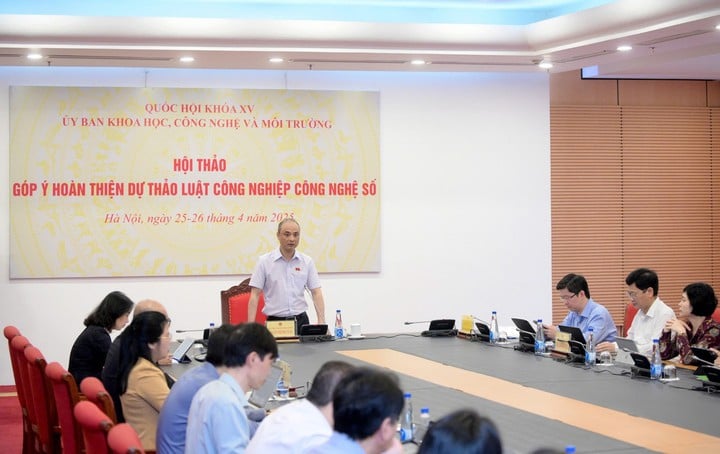
Conference scene.
Ensuring more comprehensive risk management for AI
At the workshop, delegates focused on contributing to regulations on the mechanism for controlled testing of products and services applying digital technology and artificial intelligence (AI) proposed in the draft Law.
Currently, AI is being strongly promoted in many countries with the potential to be applied in many different fields and industries, continuously creating new products. However, a high-risk AI system is an AI system that can cause serious risks and harm to human health, human rights and interests, public interests and social order and safety. Therefore, ministries and branches, based on the actual situation, develop and issue guidelines on ethical rules for the development, deployment and use of artificial intelligence systems in their respective fields.
Ms. Chu Thi Hoa - Deputy Director of the Institute of Strategy and Legal Science, Ministry of Justice, said that when developing, providing and using AI, it is necessary to ensure flexibility and adaptability; regularly evaluated, revised and supplemented to promptly meet practical needs. At the same time, it must be diverse and inclusive, suitable for increasingly wide coverage in all fields, because in the future, the development, deployment and use of AI will become more and more diverse.
The draft Law on Digital Technology Industry stipulates prohibited acts in Article 11 (including acts related to AI). However, according to Ms. Chu Thi Hoa, the Drafting Committee of the Law should note that in addition to stipulating prohibited acts, it is also necessary to add provisions restricting rights, taking into account types of acts that can only be performed under certain conditions (for example, the use of high-risk AI). Provisions on limiting rights to comply with Clause 2, Article 14 of the 2013 Constitution should be stipulated in legal documents. Therefore, the Drafting Committee should consider adding more to ensure more complete risk management for AI.
Local authorities may be consulted during the trial approval process.
Commenting on the controlled testing mechanism proposed in the draft Law on Digital Technology Industry, Mr. Nguyen Duc Lam, Institute for Policy Research and Media Development - IPS, said that instead of being given the authority to approve the testing mechanism, local authorities could support businesses participating in the testing mechanism such as funding, facilitating the construction, developing partnerships, tax incentives or creating local innovation centers that operate in parallel with the national sandbox initiative. Local authorities could be consulted in the testing approval process, especially if the business innovation is important to the locality, such as in smart cities or local financial technology initiatives.
The drafting agency of the Law project may add the following provisions on the responsibilities of Ministries, ministerial-level agencies, and provincial People's Committees (if any). In addition, it is necessary to publicize information on testing procedures and mechanisms; guidance documents; contact points of Ministries, ministerial-level agencies, and provincial People's Committees on the Electronic Information Portal so that businesses can easily look up, learn, and contact. The responsibility of State agencies is to explain to the public when businesses participating in testing mechanisms cause significant damage to consumers or fail; issue transparent reports detailing the performance and results of the tests.
As for businesses, they can file complaints or lawsuits against the regulatory agency if they believe that the agency has not performed its duties properly. For example, if the agency acts arbitrarily, ignores the rules; does not provide adequate and correct guidance, causing damage to the business; delays review and approval, causing damage to the business; or discriminates in the approval and supervision process.
Concluding the workshop, Vice Chairman of the Committee for Science, Technology and Environment Nguyen Phuong Tuan affirmed the importance of contributing to the regulations on the mechanism for controlled testing of products and services applying digital technology and AI proposed in the draft Law on Digital Technology Industry. The comments at the workshop are an important basis for the drafting agency and the reviewing agency to complete the draft Law before submitting it to the National Assembly for consideration and discussion at the upcoming 9th session.
Source: https://mst.gov.vn/xem-xet-bo-sung-de-dam-bao-day-du-hon-ve-quan-ly-rui-ro-doi-voi-tri-tue-nhan-tao-197251101210619706.htm


![[Photo] The road connecting Dong Nai with Ho Chi Minh City is still unfinished after 5 years of construction.](https://vphoto.vietnam.vn/thumb/1200x675/vietnam/resource/IMAGE/2025/11/04/1762241675985_ndo_br_dji-20251104104418-0635-d-resize-1295-jpg.webp)

![[Photo] Ho Chi Minh City Youth Take Action for a Cleaner Environment](https://vphoto.vietnam.vn/thumb/1200x675/vietnam/resource/IMAGE/2025/11/04/1762233574890_550816358-1108586934787014-6430522970717297480-n-1-jpg.webp)
![[Photo] Panorama of the Patriotic Emulation Congress of Nhan Dan Newspaper for the period 2025-2030](https://vphoto.vietnam.vn/thumb/1200x675/vietnam/resource/IMAGE/2025/11/04/1762252775462_ndo_br_dhthiduayeuncbaond-6125-jpg.webp)
![[Photo] Ca Mau "struggling" to cope with the highest tide of the year, forecast to exceed alert level 3](https://vphoto.vietnam.vn/thumb/1200x675/vietnam/resource/IMAGE/2025/11/04/1762235371445_ndo_br_trieu-cuong-2-6486-jpg.webp)








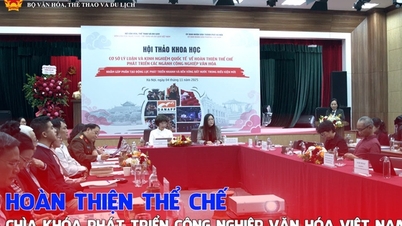







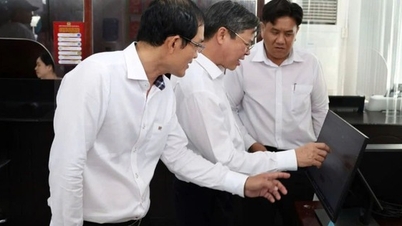

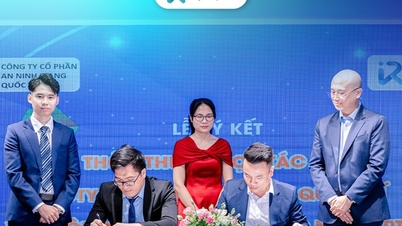



















































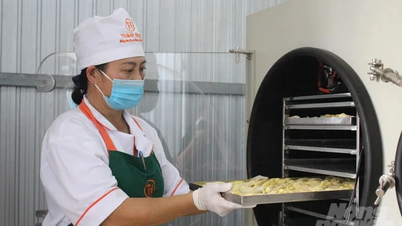
















Comment (0)